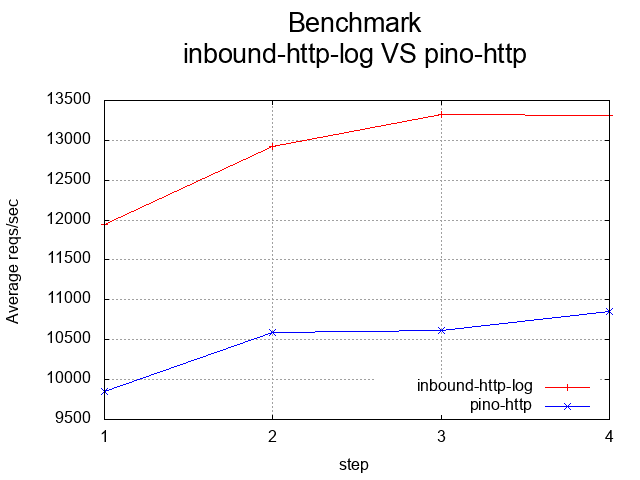Fast inbound HTTP logger for Node.js.
It is framework agnostic,
as it works with any Node.js framework (Koa, Express, hapi and others).
- Log the inbound requests/responses (one line per request-response pair).
- It is fast (Benchmark).
- The default log format is JSON (Default Format).
- Supports custom message formats (Custom Format).
- No logger is required (Loggers).
- It can be used with any logger of your choice (
winston,pino,log4jsor others) (Loggers) - It can use the morgan http-logger, or any other similar express http-logger middleware, without using the express framework (Use-morgan).
- Supports request IDs (Request Id).
- Supports request header white-listing (Log Headers)
- It can be used with any
Node.jsframework (Express,Koa, or others).
- It is simple to use, by just adding one line to your code(How To Use).
- It has no other dependencies.
Install:
npm i --save inbound-http-log
Use it in your server:
require('inbound-http-log')()
The examples can be found in the examples folder.
{
"req": {
"time": 1519231699701,
"method": "GET",
"url": "/",
"headers": {
"host": "localhost:3001",
"connection": "keep-alive"
},
"from": "::ffff:127.0.0.1"
},
"res": {
"time": 1519231699706,
"status": 200,
"header": "HTTP/1.1 200 OK\r\nDate: Wed, 21 Feb 2018 16:48:19 GMT\r\nConnection: keep-alive\r\nContent-Length: 11\r\n\r\n"
},
"pid": 42394,
"hostname": "MacBook-Pro.local",
"id": 465143,
"responseTime": 5,
"tag": "served"
}The obj argument in the folowing example is described here: Default Format
// example
require('inbound-http-log')({
stringify: obj => {
return `${obj.req.method} ${obj.req.url} ${obj.res.status} ${obj.responseTime}ms`
}
});If the Default Format object does not contain, some information that you need from the request or the response object, then you can specify your own parsers:
require('inbound-http-log')({
parseReq: request => {
// parse the given request and return the parsed object
},
parseRes: response => {
// parse the given response and return the parsed object
}
});By default no other logger is required.
The log messages will be written in the stdout.
If for any case you need to use another logger instead of stdout.
It can use any other logger by passing your logger instance in the options argument:
require('inbound-http-log')({
logger: // Put your logger instance here.
// The logger instance must be an object with .info() and .error() methods.
});When the statusCode of the response is greater than or equal to 500, then the logger.error() method will be used.
In all other cases the logger.info() method will be used.
If you prefer the morgan style of customization/formatting , then you can pass morgan as a configuration argument.
This can also be used if you want to use the morgan module without using the express framework.
(for example koa, hapi, restify).
// See the morgan docs for available options (https://github.com/expressjs/morgan)
const morgan = require('morgan')('tiny');
require('../inbound-http-log')({expressMiddleware: morgan});In this case, the rest of the formating/parsing configuration arguments(if any) will be ignored and
you should configure the morgan instance according to your needs.
// example
require('inbound-http-log')({
getRequestId: (request) => {
return request.headers['X-Request-Id'] || 1
}
});By default all the request's headers will be logged.
If this is not the desired behavior, then you can specify which request headers will be logged.
To do this, give an Array of headers in the options Object.
// example
require('inbound-http-log')({
headers: ['connection', 'Authorization']
});The benchmark measures the average throughput (requests/second),
for two Node.js servers that serve the 'hello world' String.
- One of the servers uses the
inbound-http-logmodule. - The other server uses the http-pino module.
The benchmark runs in five steps.
Each step is executed using autocannon with 100 connections and 10 pipelined requests.
The hardware used for the benchmark is the following:
➜ ~ /usr/sbin/system_profiler SPHardwareDataType
Hardware:
Hardware Overview:
Model Name: MacBook Pro
Model Identifier: MacBookPro12,1
Processor Name: Intel Core i5
Processor Speed: 2,7 GHz
Number of Processors: 1
Memory: 16 GB
To run a step of the benchmark and get the results in the terminal:
cd benchmark
npm i
node inbound-http-log.js
bash ./bench.sh 3001
node pino-server.js
bash ./bench.sh 3002
